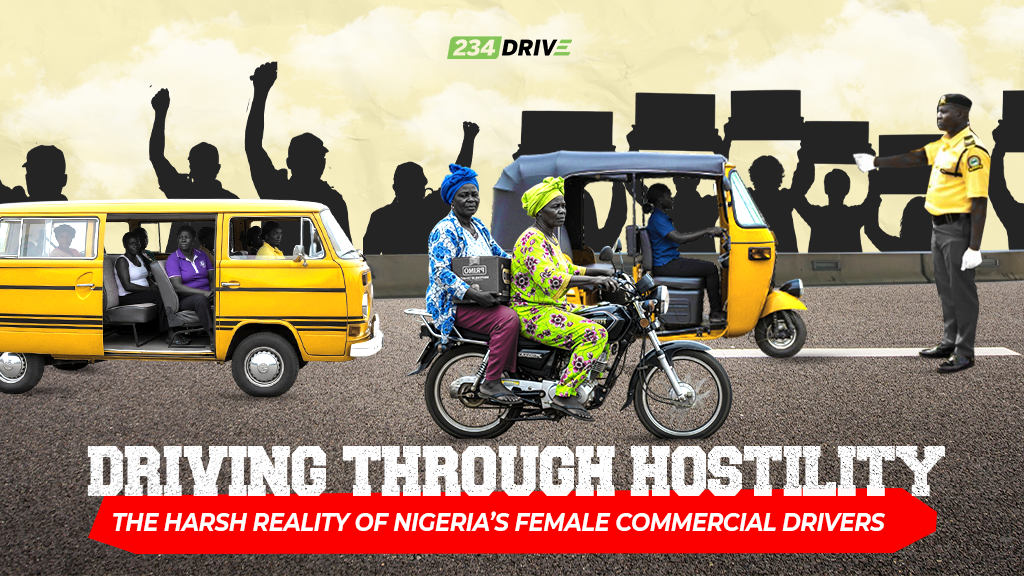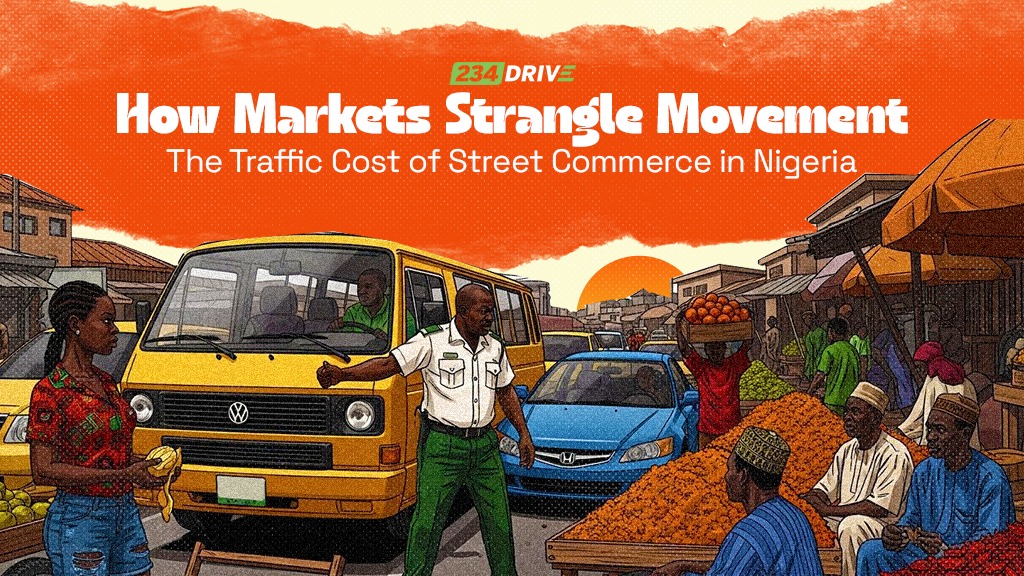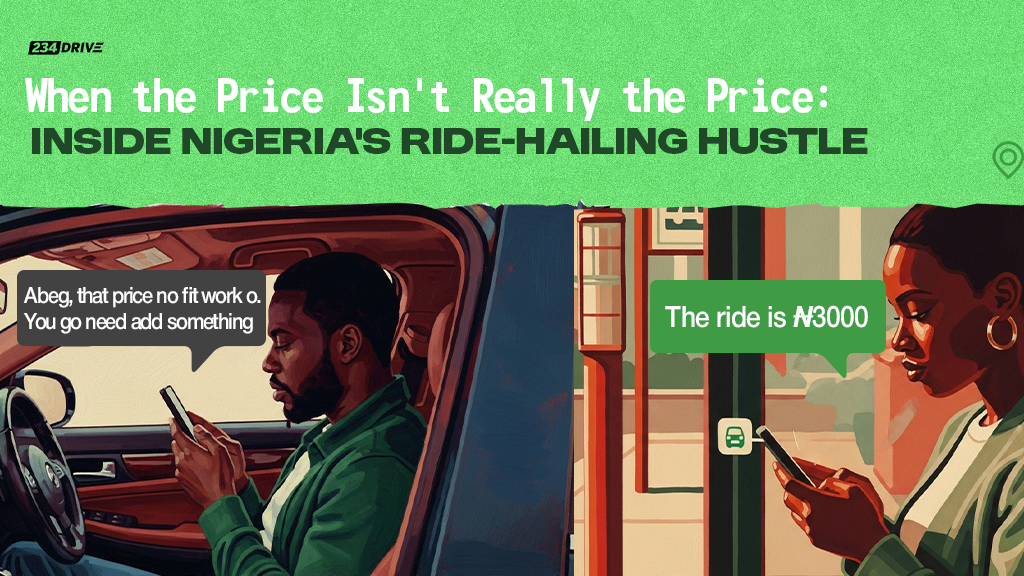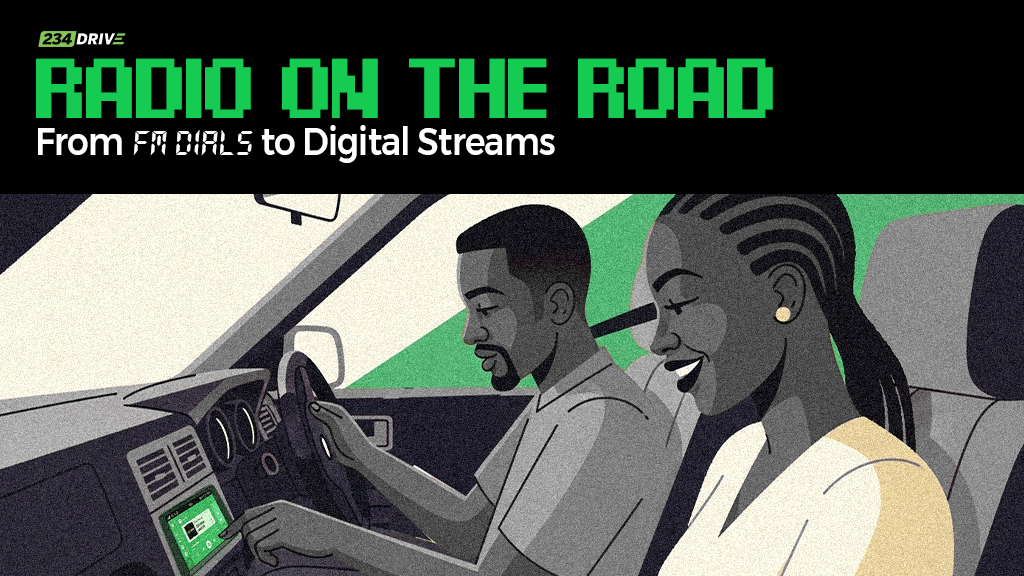Spotting a female bus driver in Lagos is a rarity. The first time I boarded a Danfo driven by one, I found myself curious about her story with the kind of fervour I would never have for a regular (male) bus driver. I wondered the events that led her here, the courage she must have mustered to take up space in an industry dominated by men. Not just any male-dominated industry but Lagos’s brute public transport industry, where the system suffers violence and the violent take it by force.
During inexplicable bus scarcities, Lagosians tussle through the masses for a prized seat on a rush hour morning, in the rat race that defines the city’s soul. Buses hardly ever stop; they slow, enough to let a passenger quickly alight or hop in but not long enough to waste time or fuel. Agberos (AKA ‘Area Boys’) demand their tolls. No toll, no passage. Drivers comply even if they have lost count of how many N200 notes they have handed to an agbero at each stop. Because not complying will be met with violence. A shattered mirror. A broken windshield. A bruised body. It’s a daily risk. And for women in the system, the stakes are even higher.
How Lagos’s Transport Tax Works—And Who Pays the Price
At the heart of this transactional ecosystem is the National Union of Road Transport Workers (NURTW)—a quasi-union, quasi-enforcement body that oversees operations at many of the nation’s parks and stops. In Lagos in particular, through an entrenched structure of local chairmen and agberos, the NURTW imposes various levies on commercial drivers under the guise of daily dues, loading fees, or ‘security’ charges. As detailed in a 2023 The Republic essay, these payments are not always uniform or transparent and often inflate arbitrarily. Compliance ensures peace; resistance invites punishment. This opaque system leaves drivers—especially women—vulnerable to abuse.
On the 1st of July, a now-viral video posted by @fattylincorn_01 highlighted this vulnerability. In the clip, a female bus driver and conductor, Victoria Olajide, recounts how she was assaulted at a stop for refusing to pay an inflated loading fee. Speaking in Yoruba before the Lagos State NURTW chairman, Alhaji Mustapha Adekunle ‘Sego’, she explained:
‘On that particular Monday, I was working as a conductor [rather than a driver]. When we got to Abraham Adesanya, I handed the man N200 as I usually do at that stop to the men who help us load the bus. Instead, he demanded for N500, but I refused since that was not the standard fee, so he started beating my chest. Other men had also demanded more in the past, but the most they would do was shout and leave me, in respecting that I am a woman. But this man chose to beat me up. I haven’t been able to work since that day because my chest is still paining me.’
Olajide added that the following Wednesday, the local chairman (of the Ajah zone) beckoned her to join him at the police station where the assailant was being detained. There, Olajide requested that the man be released on bail and punished by whom she deemed the relevant authority, the NURTW.
Thus, in the viral video, the assailant knelt before the NURTW chairman and other officials while his fate was decided. Chairman Sego’s verdict was that the assailant would be suspended until further notice. Additionally, the lower-level officials—notably all men—who had intervened on the day of the incident shared that they had paid Olajide N200,000 as compensation and would also cover the cost of a chest X-ray scan. Chairman Sego also stated that after seeing the result of the scan, Olajide would be the one to decide the man’s future in the NURTW. For this, Olajide expressed her heartfelt gratitude.
Virality Before Validation?
But what did it take for the NURTW to reach this decision? A video Olajide posted herself. Yet another addition to the string female drivers have posted in recent months detailing their horrific experiences and demanding for protection.
In April, it was bus driver Yetunde Amole Mohammed who was beaten up and even had her clothes ripped off while trying to stave off an agbero attempting to steal her vehicle’s battery. After the video went viral and caught the media’s attention, NURTW stepped in and called Amole to their office. Chairman Sego insisted that the agbero was not affiliated with NURTW, and that such behaviour would not be tolerated within the union.
Yet, 3 months later, such behaviour has indeed been replicated by the union’s members, not just for Olajide but also another female bus driver called Titilayo Adeolu.
On 30th June, a Adeolu posted a video narrating her painful ordeal at Mowe-Ibafo bus stop, a popular transit point between Ogun State and Lagos State. The mother of two agitatedly recounted how, after being rendered immobile for two months due to mechanical faults with her Korope (minibus), she resumed work that morning only to allegedly be flogged by NURTW agberos because she was unable to pay her toll at the time.
‘I told them I would pay when I got back since I was just starting work for the day, but they started beating me up. They took out the rubbers on my bus, punctured my tires and started flogging me. This is how they take advantage of women, even when we don’t wrong them in any way,’ Adeolu said.
But she didn’t stop there. She proceeded to call out the government for their indifference to the awful plight of female bus drivers. ‘And you the government, what are you doing about women’s matters? The country is hard, there is no money. Still, we go out there and find a way to earn a living. Yet, these agberos keep extorting us. We still buy fuel and oil for maintaining our vehicles. So how much are we then supposed to take home?’
For Adeolu, what made the situation even more painful was that she was yet to finish paying for the ownership of the vehicle and had also taken out another loan to fix its engine and gear issues.
Thankfully, the video caught the attention of the Ogun State NURTW chairman Alhaji Akibu Efele who, as Adeolu narrated in another video, reportedly paid off her vehicle loan and ordered her attackers to prostrate and apologise.
But the question remains: is any of this enough? These acts of restitution, while well-meaning, are reactive and inconsistent. And they shouldn’t require virality to take place.
Sisterhood Behind the Steering Wheel
Female commercial drivers may still be relatively few in number, but their presence is growing—and increasingly visible in the nation’s buses and kekes. The push is largely owing to Nigeria’s poor economic state; women are seeking any and every legitimate way to secure their futures and that of their children. However, this kind of daring can hardly be sustained in isolation.
Enter women’s groups like Ladies on Wheels Association of Nigeria (LOWAN) and Female Drivers Association (FEDAN).
Nkechi Abiola founded LOWAN in 2018, after realising her voice and that of other women were not as welcome in mixed-gender forums. According to an Al Jazeera feature, the association had a membership of 5,000 female commercial drivers nationwide as of 2024. LOWAN has become a haven for these women, offering emotional support, business guidance, loans to help them gain ownership of their vehicles, rotating saving schemes (called ajo) and much more. The group also actively campaigns against gender-based violence.
LOWAN provides a safe space for women drivers to share the unique burdens they bear: harassment and assault from passengers, police officers and agberos alike, rejection from passengers who erroneously believe that women are poor drivers, and so on.
The Female Drivers Association of Nigeria (FEDAN), founded by Amb. Eunice Odeghe, complements these efforts with a stronger focus on advocacy and policy engagement. With over 800 members across Nigeria’s six zones, FEDAN offers training, access to support schemes, and fights gender-based harassment. Following Yetunde Amole’s assault in April, FEDAN issued a public statement condemning the violence.
And on 5th July, FEDAN posted an episode in their Facebook video series, Female Drivers Matter, calling for an end to systemic abuse. Odeghe passionately charged:
‘Is there not supposed to be a gender balance in the transportation sector? What wrong have these women done that make these men panel beat them like they are not human beings? Every time, we keep hearing stories of violence against female commercial drivers. I’m calling on the government, policymakers, law enforcement, and the public to help end this violence—now. Some women have stopped working out of fear for their health, stuck at home and unable to earn. If you’re a man looking to prove power, don’t take it out on female commercial drivers. Enough of this. Allow these women to have their freedom. Allow these women to be independent.’
The Road Ahead: What Real Change Looks Like
If Nigeria’s informal transport system is to truly serve everyone, women cannot remain an afterthought. The NURTW—and other relevant bodies—must not only welcome women but protect them. It means zero tolerance for gender-based violence, real complaint systems, and women in leadership.
The government, too, must go beyond announcements. Financial support is good—but legal enforcement is better. The Violence Against Persons Prohibition Violence Against Persons Prohibition (VAPP) Act exists for a reason, and it must be upheld.
Most importantly, the culture must shift towards more acceptance of female commercial drivers.
Until then, women like Victoria Olajide and Yetunde Amole Mohammed will keep showing up. They rise before dawn, confront the system, and work—often better than the men trying to shut them out.
These are the women who dare to take the wheel, even when the road is rigged against them.










